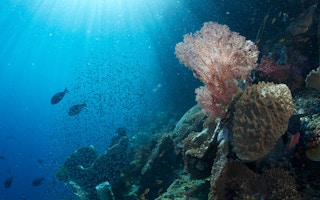The long stretches of coastline and rich marine biodiversity of Asian countries came under the spotlight at the recent week-long Asia Conference on Oceans, Food Security and Blue Growth (ACOFB), which officially closed on Friday.
To continue reading, subscribe to Eco‑Business.
There's something for everyone. We offer a range of subscription plans.
- Access our stories and receive our Insights Weekly newsletter with the free EB Member plan.
- Unlock unlimited access to our content and archive with EB Circle.
- Publish your content with EB Premium.
Organised by the Indonesian Ministry of Marine Affairs and Fisheries, the Dutch Ministry of Economic Affairs, the World Bank and United Nations Food and Agriculture Organization, the conference, held since Tuesday, revolved around the theme of “Blue Growth for Prosperity.”
Conference participants, a gathering of various government representatives, academics, NGO leaders and entrepreneurs from 42 countries, were called to act on implementing ‘The Blue Economy’ approach.
This requires protecting marine resources, increasing and ensuring food resilience, and prioritising coastal development in the region. Essentially, the focus is to use the surrounding waters sustainably for economic prosperity.
Saut P Hutagalung, Director-General for Capture Fisheries Processing and Marketing in the Ministry of Marine Affairs and Fisheries (MMAF) in Indonesia, outlined challenges facing the marine environment.
The effects of climate change, poverty in coastal communities, and water hygiene are some of the obstacles that Asia Pacific countries are grappling with.
To address these concerns and other related issues, the conference was divided into six sessions:
- Ocean Policy Directive Linkage with Investment Guidance Toward Food Security 2020
- Research Priorities to Secure Food From the Ocean
- Provoking Issues on Oceans, Food Security and Blue Growth
- Identification of Key Issues by Sharing Experiences Formulating and Knowledge in Asia Roadmap Initiatives
- New Ideas and Approaches to Public Private Partnership
- Oceans, Food Security and Blue Growth: Alignment and Asian Roadmap for Recommendation
These specific sessions led to the creation of an eight-point action plan, which zeroed in on poverty alleviation and the sustainable utilisation of natural resources by way of policies and data management.
Supplementing the plan are seven strategies that encourage regional collaboration, especially in the areas of knowledge sharing, capacity building, and looking for funding.
According to Hutagalung, the plan of action also includes the repair and restoration of habitats and fisheries due to overfishing and marine ecosystem degradation.
He added: “All the participants also agree to give increased support to small-sized fishery businesses and local community initiatives, as well as strengthening marine resilience to the impact of climate change in the Asia region.”
Supporting fisheries, as discussed in ACOFB, entail reducing inefficiencies. Conference delegates will see to creating a ‘Natural Capital Accounting’ initiative, better data sources on investment opportunities and improved logistics and infrastructure.
As for other courses of action, the conference plans to establish joint research efforts among the scientific community to bring about a renewal of marine energy in the Indian and west Pacific Ocean, learn more about the impact of climate change and establish an international oceanography committee.










